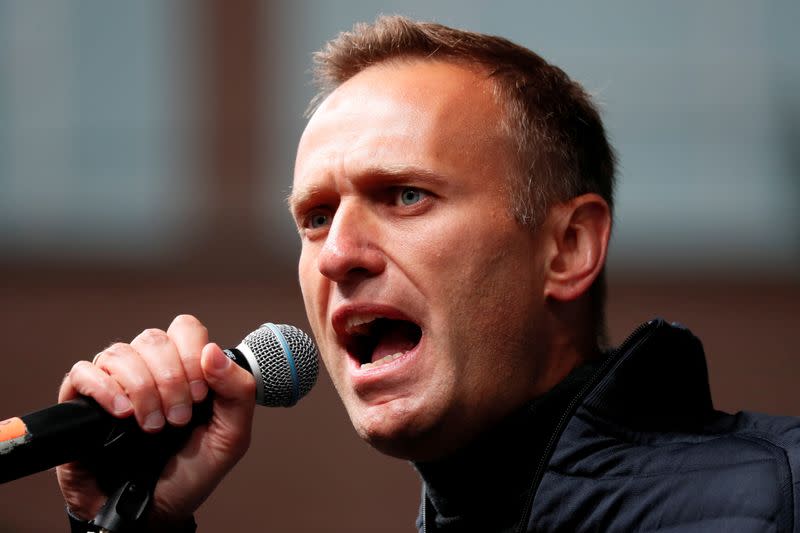By Tom Balmforth and Anton Zverev
MOSCOW (Reuters) – Kremlin critic Alexei Navalny was transferred to a ward with symptoms of respiratory disease and tested for coronavirus, the Izvestia newspaper reported on Monday after saying he had a high fever and cough.
Navalny, a prominent critic of President Vladimir Putin who declared a hunger strike last week and accused prison officials of denying him adequate treatment for severe back and leg pain, previously claimed that there was an outbreak of tuberculosis in his ward.
The 44-year-old politician whose release the West demanded said that three people in his ward were hospitalized with tuberculosis and joked that getting the disease could offer him relief from his other illnesses.
“If I have tuberculosis, then maybe that will take away the pain in my back and the numbness in my legs. That would be nice, ”he wrote on Instagram.
He said prison officials measured its temperature at 38.1 degrees Celsius (100.6 degrees Fahrenheit). He also said that he had a strong cough.
Hours later, Izvestia, a pro-Kremlin newspaper, quoted a statement from the federal prison service saying that he had been transferred to a ward and had several tests, including the coronavirus.
Izvestia’s report did not say where the infirmary was located, but one of its lawyers said it appeared to be within the IK-2 corrective penal colony, 100 km east of Moscow, where he was being held, reported the TV channel Rain. .
Navalny accused prison officials of depriving him of sleep by waking him up hourly at night and refusing to give him adequate medical care.
Prison officials deny sleep deprivation and previously said that Navalny’s condition was satisfactory and that he received all necessary treatment. The prison that detains him did not immediately respond to a request for comment on Monday.
His allies said at the end of last week that they would hold a continuing protest outside his prison starting on Tuesday, unless he was examined by a doctor of his choice and received what they considered a suitable remedy.
Navalny’s lawyers regularly visited him in custody and helped him continue to post messages on social media.
Amnesty International’s secretary general, Agnes Callamard, said she appealed to Putin about “Navalny’s arbitrary arrest and deteriorating state of health”.
“There is a real prospect that #Russia is subjecting him to a slow death. He must have immediate access to a doctor he trusts and must be released, ”she wrote on Twitter.
State media and some members of a prison monitoring group accused Navalny of faking his medical problems to keep himself in the public eye, which Navalny and his allies deny.
(Additional reporting by Vladmir Soldatkin and Polina Nikolskaya; Editing by Timothy Heritage)
